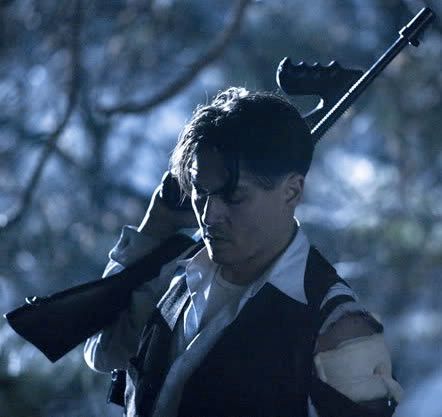I got so much trouble on my mind, I refuse to lose

Michael Mann likes to make movies about men. Men who speak tersely and intently, conveying their views and plans with a creased-brow seriousness. Men who stride purposefully through the world. Men who stare each down across diner tables or through jail cell bars and firmly, evenly announce who they are and what they plan to do. His movies (and, for that matter, TV shows) present quietly confident masculinity as a worldview. Even proclamations of love emerge as chest-thumping assertions of machismo. In that respect, Public Enemies fits into his oeuvre perfectly.
Public Enemies covers the final couple of years in John Dillinger's life and career. As played by Johnny Depp, he's a stalwart bank robber, operating with a code of honor that prevents him from supplementing his take from the insured riches in the vault with the crumpled dollars in the hands and pockets of the institution's patrons. Others operating on the wrong side of the law tell him to drop the bank jobs in favor of more complex and lucrative schemes, especially with the feds starting to crack down on the showy crimes, but he remains true to his chosen path. The world is simultaneously closing in and passing him by, and Mann tries to capture this moment in time, when the bad guys positioned themselves so comfortably in the heart of the spotlight that they could become folk heroes. Just because this ground has already been covered definitively doesn't mean it's impossible to explore it anew, spin something interesting out of it. The problem is simple. Mann usually gives only cursory attention to the ideas he introduces. Instead it's largely a set of interlocking set pieces. As usual, Mann's movie is all surface, no insight.
With nothing to really dig into, the actors barely register. Entrapped by the icy cool of his character, Johnny Depp is unable to bring any of his wildfire inventiveness to Dillinger. He emanates no more danger than he does in a GQ photo shoot. As Melvin Purvis, the lawman on his trail, Christian Bale is at his most rigid. Even his moments of doubt are played with unyielding dour focus. Meanwhile, Billy Crudup plays J. Edgar Hoover with a cliched 1930's pinched-nose patter that suggests he be happiest if he were simply cast as a Philco radio. Only Marion Cotillard seems to value the notion of playing an actual person, with hints of something recognizable as emotion. She doesn't dazzle with her depth as Dillinger's dame, Billie Frechette, but she wrenches a couple of truer moments into the film. When a film is as controlled and monotonous as Public Enemies, every breath of humanity helps.
(Posted simultaneously to "Drilling Holes in the Wall.")